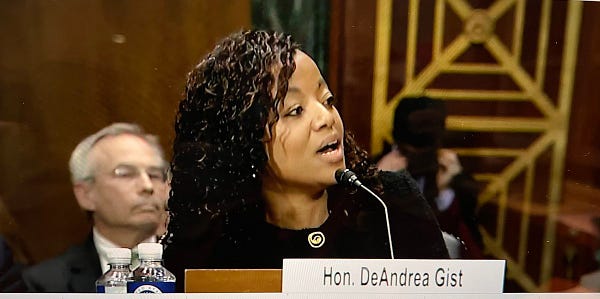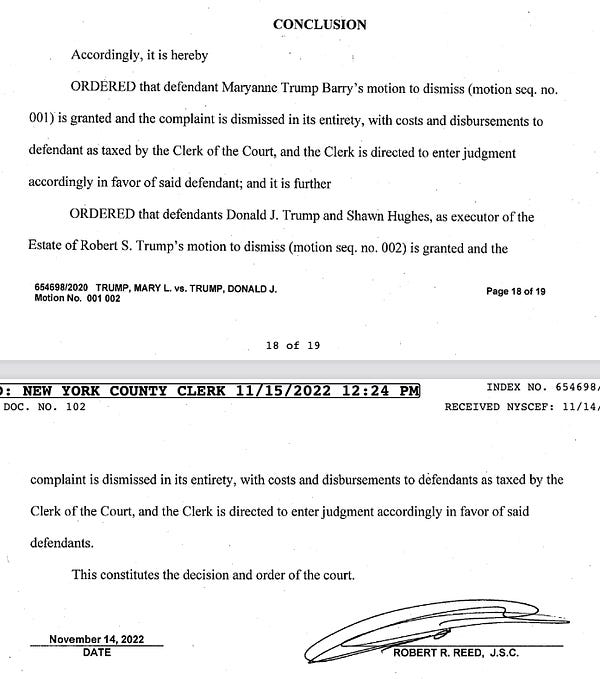Even before we got to Trump’s “big announcement” Tuesday evening, there was more legal news than any one person could reasonably be expected to take in. In the interests of keeping up, I’ve flagged the key items for you tonight, using a series of (mostly) my tweets from today.
1. The SDNY won’t be prosecuting Rudy Giuliani
Yesterday, we learned that prosecutors in the Southern District of New York do not plan to indict Rudy Giuliani following an investigation that included seizing Giuliani’s electronic devices and searching his phones. We know this because prosecutors advised the court that they no longer required the services of the special master in that case, apparently releasing her to work on other matters. While it’s unusual to take a step this significant in a case like this and come up empty-handed, I think it’s a mistake to read something nefarious or corrupt into this. Sometimes prosecutors fall short in finding sufficient evidence to obtain and sustain a conviction, beyond a reasonable doubt—the standard they are required to reach by the federal principles of prosecution before indicting a case. Knowing when not to indict a case is important, and although it’s surprising here, there’s no reason to believe prosecutors did anything other than evaluate the evidence and decide the case wasn’t there.
Part of that could involve a recent string of acquittals in prosecuting cases that center around a defendant’s failure to register as a foreign agent or make disclosure in that regard. That may have led to an assessment of allegations of that type in a realistic light that fueled this decision.


It’s game on in Fulton County, Georgia, where the district attorney has been investigating Trump and those around him for interference in the 2020 election. She already has Trump, trying to extort Georgia’s secretary of state over the phone, saying, “I just want 11,780 votes.” After some pre-election delays, Trump cronies are out of excuses and are testifying before the grand jury. There are reports that Governor Brian Kemp testified today (Tuesday) and that Cassidy Hutchinson will also testify, perhaps later this week. Former Lt. General Mike Flynn is in court in Florida trying to fight his subpoena (usually county DAs can’t pursue their subpoenas against out-of-state witnesses, but a compact among some states, including Georgia, Florida, and South Carolina, has let Fulton County D.A. Fani Willis subpoena these witnesses, who then go to court in the state where they reside to initiate a challenge. So far, they’ve been unsuccessful). South Carolina Senator Lindsey Graham is expected to testify Thursday, after losing his challenge, but retaining the right to object to questions that may violate his speech or debate privilege as a member of Congress. Former Georgia Congressman Newt Gingrich and Trump chief of staff Mark Meadows are expected to testify before the month ends. Willis is fleshing out the testimony she has taken about key meetings leading up to Trump’s efforts in Georgia, and she’s locking in testimony from key witnesses who could show up for the defense. It’s important for her to know what they would say on the witness stand if she were to prosecute the former president.
Willis may well be headed that way after the statement she made today. I’m reading this as an indication that her special grand jury, which is purely investigative, has completed its work and she has made a decision that she will present their work to a regular grand jury that has the power to indict cases.


Chuck Schumer, who has to be awfully happy to have the majority leadership role in the Senate to look forward to for the next two years, announced he had scheduled a vote Wednesday on a measure designed to codify the right to same-sex marriage. After delays ahead of the midterms, the bipartisan group that includes GOP Sen. Rob Portman of Ohio, Democratic Sen. Tammy Baldwin of Wisconsin, GOP Sen. Susan Collins of Maine, Democratic Sen. Kyrsten Sinema of Arizona, and GOP Sen. Thom Tillis of North Carolina, released a statement Monday saying they “look forward to this legislation coming to the floor” and that “through bipartisan collaboration, we’ve crafted commonsense language to confirm that this legislation fully respects and protects Americans’ religious liberties and diverse beliefs, while leaving intact the core mission of the legislation to protect marriage equality.”
The devil is always in the details with a compromise of this nature, and as the bill advances, we’ll see whether its protections hold up. I’ve seen some early criticism that the compromise version of the bill is too watered-down to provide real protections, but I haven’t had a chance to study it carefully yet. But following Dobbs, a clear statement of congressional intent to preserve marriage equality would be very welcome, given court challenges that are likely coming.


Arizona GOP chair Kelli Ward has been trying to avoid a subpoena from the January 6 committee that would reveal who she was in conversation with in the run-up to the insurrection. On Monday, the Supreme Court put an end to that. That’s good. But the order itself, a 7-2 decision, featured Justice Clarence Thomas in the dissent.
Justice Thomas’s wife, Ginny, now widely known for her conservative political activism, was involved in the efforts to overturn the election in Arizona, urging legislators to reject lawful election results. Even if you don’t believe that’s an actual conflict of interest for Justice Thomas, judicial canons of ethics require judges to avoid the appearance of impropriety. It’s hard to conclude Justice Thomas didn’t run afoul of that requirement by participating in the case.


There are complicated separation-of-powers issues that could make it difficult, if not unconstitutional, for Congress to impose ethics rules on the Supreme Court. The Court itself, unlike the rest of the federal judiciary, does not operate under binding ethical constraints. Each Justice is left to follow his or her own moral compass, and that process has clearly failed, if public confidence in the Court is the measure of its success. If the Court is serious about holding the public’s trust, it’s going to have to show it deserves it. Adopting new rules and following them would be a good start. The Chief Justice faces a test here. In this case, he didn’t do a very good job.
Earlier this week, we talked about the importance of Biden’s appointments to the federal bench. Today, the Senate Judiciary Committee held hearings on the first batch of nominees following the midterm elections. They are a diverse and highly qualified group. Joe Biden is giving Democrats a master class in understanding the importance of the judiciary when it comes to voting for a president.
A state court judge dismissed Mary Trump’s case against her uncle, Donald Trump, and other family members, claiming she was cheated out of her inheritance. The judge dismissed the case because of a waiver she signed, but Mary Trump has offered evidence in pleadings that the waiver was fraudulently obtained by withholding important information about valuation and other matters from her. Full disclosure, Mary is a good friend. But leaving that aside, my legal opinion is that the issue is much closer than the trial judge’s ruling suggests. There will likely be an appeal, asking the appellate court to reconsider the validity of the waiver in these circumstances.
November 22. That’s the date the 11th Circuit will hear oral arguments in Trump’s efforts to short-circuit the Mar-a-Lago investigation. Just one week from today. This is consistent with the court’s earlier decision to grant the government’s motion to expedite consideration of the appeal. DOJ wants the court to dismiss the appeal so it can continue with its criminal investigation unhindered. DOJ argued in initial motions before the court, which that panel agreed with, that Judge Aileen Cannon inappropriately inserted herself into the criminal matter. DOJ will have a different panel of judges when the appeal is heard in Atlanta next week, and while the decision of the prior motions panel isn’t binding on the decision panel, their analysis was compelling. Godspeed.
 11th Circuit wasn't fooling around when it expedited Trump's Mar-a-Lago appeal. Nov. 22. Happy Thanksgiving.JUST IN: Appeals court scheules oral arguments in DOJ appeal of Judge Cannon's special master order from Nov. 22 -- in case anyone was naively hoping for a quiet Thanksgiving week. https://t.co/hKrHD5oTY6
11th Circuit wasn't fooling around when it expedited Trump's Mar-a-Lago appeal. Nov. 22. Happy Thanksgiving.JUST IN: Appeals court scheules oral arguments in DOJ appeal of Judge Cannon's special master order from Nov. 22 -- in case anyone was naively hoping for a quiet Thanksgiving week. https://t.co/hKrHD5oTY6 Kyle Cheney @kyledcheney
Kyle Cheney @kyledcheneyLast but not least, a flag on a new voter protection lawsuit. Marc Elias has filed in Georgia, challenging a restriction on early voting in the runoff election. This is classic voter suppression. People who work and have child care responsibilities during the week often find it easier to vote on the weekend, and holiday weekends are opportunities, among other things, for Black churches to engage in “souls to the polls.” Nothing has changed in Georgia law, so why are (Republican) election officials restricting voting on a Saturday following a holiday? This case is one to watch.
 In the 2020 Georgia Senate runoff, multiple counties had early voting on the Saturday following a holiday (Christmas Day). But now, with Senator Rev. Warnock on the ballot as an incumbent, @marceelias sues b/c Georgia wants to stop voting that day. Can't imagine why.🚨BREAKING: @DSCC, @ReverendWarnock, @GeorgiaDemocrat sue Georgia over guidance banning early voting on Saturday, Nov. 26 for the Dec. 6 Senate runoff. Proud that @EliasLawGroup is taking on this fight for voting rights in Georgia. https://t.co/sTp4b4EdIC
In the 2020 Georgia Senate runoff, multiple counties had early voting on the Saturday following a holiday (Christmas Day). But now, with Senator Rev. Warnock on the ballot as an incumbent, @marceelias sues b/c Georgia wants to stop voting that day. Can't imagine why.🚨BREAKING: @DSCC, @ReverendWarnock, @GeorgiaDemocrat sue Georgia over guidance banning early voting on Saturday, Nov. 26 for the Dec. 6 Senate runoff. Proud that @EliasLawGroup is taking on this fight for voting rights in Georgia. https://t.co/sTp4b4EdIC Marc E. Elias @marceelias
Marc E. Elias @marceelias
That’s a lot for one day, and it’s only Tuesday!
We’re in this together,
Joyce








Nothing to do with today’s column but I have gone off Twitler... wouldn’t it be delicious for Liz Cheney to peel off 10 republican congressman and all the democrats and run for Speaker of the House...
Always brilliant, thoughtful, thorough, and timely. Thanks you for such incredible effort for the cause of good, democracy, ethics/accountability & DEMs!